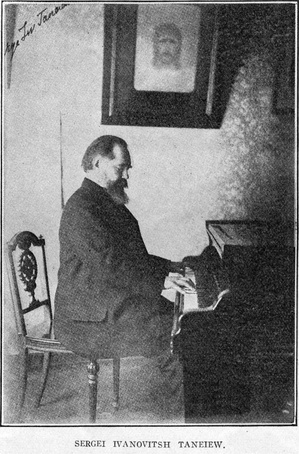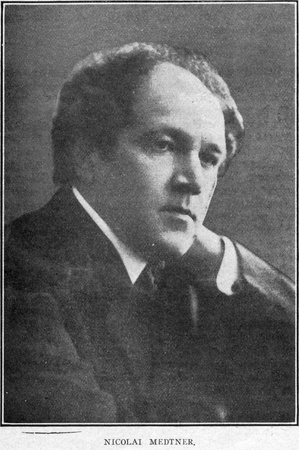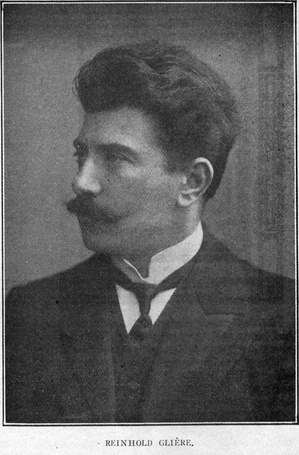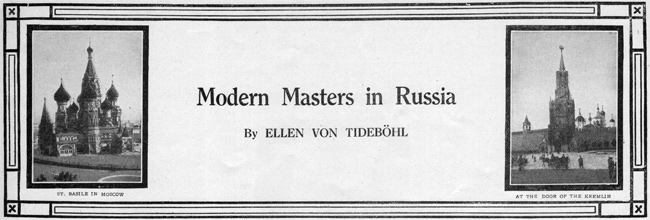
Russian music begins to interest the world more and more, and every year brings forth new works by young composers which are well received.
Moscow is the musical center of Russia, and teems with musical talent. It offers every facility for the study and development of musical gifts. Many of the leading Russian composers were born here, and received all their training at the Conservatoire.
A group of composers of the younger generation entirely belongs to the Moscow school, and have received their training mainly at the hands of Sergei Ivanovitsh Taneiew, the great master of counterpoint, who has inspired them all with a true comprehension of their aim in art and the destiny of their talent.
Taneiew was born in 1859. His father was a highly-placed bureaucrat, so that the boy received a very good education. He showed at an early age his exceptionally great musical gifts, so was sent to the Conservatoire at ten years of age, but continued his other education at home under the direction of first rate teachers.
Nicolai Rubinstein (brother of Anton Rubinstein), director of the Conservatoire, gave the boy piano lessons and took an interest in him. He became soon one of his favorite pupils. And no wonder, for Taneiew was capable of catching the innermost idea conveyed by Rubinstein’s teaching. Taneiew as a pianist reminds us in his manner of playing of the wonderful performance of Nicolai Rubinstein, that great musician, who introduced musical culture into Moscow and thus awakened the dormant musical powers of his nation. Thirty years have just elapsed since he died, but his work continues and Russia will never forget the debt she owes him. Taneiew finished his studies at the Conservatoire in 1875 and received the “Golden Medal.” It was the first time it had ever been awarded to any one at the institution.
He became active as composer, pianist and teacher, was director at the Conservatoire from 1885 till 1889, and managed it so well that it prospered under him. However, he retired from this post, as he wished to give himself up entirely to composition and study. He remained at the Conservatoire, however, as professor of counterpoint.
Young composers crowded round Taneiew. He became their leader. All of them developed under his careful influence and realized the course they must take in order to develop each one his individuality and style suitable to his own gifts.
Taneiew is a teacher of rare energy with a systematic analysis in everything he does. He lays great stress on the importance of the study of the standard works of old masters. He himself in his compositions is more classical than modern. His works are always interesting and of great beauty and bear the stamp of being the production of a great musician. Symphonies, choral works, string quartets, trios, romances, etc., he has composed. Taneiew is also a writer on musical matters: his books on counterpoint, on musical forms are of immense value and are in the hands of all our Russian composers. Taneiew is the father of them, always ready to help them in their aspirations and struggles.
Now let us pass to the composers of his school in Moscow: the first group includes the great names of Rachmaninoff, Scriabin and Nicolai Medtner. All three have nothing of Russian melody in their music—they are quite international.
To the second group belong Vassilenko, Glière, Gretshaninoff, composers who first began by writing in a Russian style, but later on seemed to hesitate, between this and Western music, finally settling under the influence of modern music; although they still sometimes return to the flowing melodies of their nation.
SERGEI RACHMANINOFF.
Rachmaninoff now resides in Moscow and St. Petersburg, holding the post of inspector of music classes over the whole of the Russian Empire; sometimes he wields the baton at great symphonic concerts and plays as soloist, but he devotes the greater part of his time to the development of his creative power. Rachmaninoff was born, in 1873, in the district of Novgorod. At the age of nine he entered the Petersburg Conservatoire, but later passed on to the Moscow one, so as to have Taneiew for his teacher in harmony and counterpoint. He completed his education in 1891, and as a mark of distinction, a golden medal was awarded to him. Silotti, the famous pianist, his cousin, was his piano-master.
The world soon recognized Rachmaninoff’s musical genius; his compositions were performed and admired everywhere, especially when he himself was the performer at the piano or the conductor of the orchestra. Germany, England, and even America had opportunities of hearing him. He composed operas, symphonies, concert pieces for piano, trios, romances, choruses of sacred music, small piano nieces, etc., and in each form he has attained great perfection, so that it is difficult to say in which branch he has produced the most remarkable works.
ALEXANDER SCRIABIN.
Scriabin was born in Moscow in 1872. He was educated in a military school, from where he passed to the Conservatoire of Moscow. Safonoff interested himself in the young student and gave him piano lessons. Taneiew taught him counterpoint. At the end of his course at the Conservatoire in 1891 he won the first prize. In 1897 Scriabin was nominated professor at the Conservatoire, but pedagogic duties did not suit his taste, for he retired from his post after five years of professorship and now lives as a free man, able to give himself up entirely to composing. He passed several years abroad, but is at present residing in Moscow, his native town. With every succeeding year his genius seems to develop more fully. At first he was not understood; he was thought a composer of sickly, weak character, who employed dissonances and new harmonic progressions only to produce effect! Chopin was a kindred spirit of his under whose influence he doubtless fell, but he imitated him only in a few outward features. The farther Scriabin advanced in his musical development, the more he became the poet, the thinker, the musician opening up a new path. The impetuous aspirations and struggles of Nietzsche’s Superman, with his yearnings after individuality, became the basis of his compositions.
The piano became too limited an instrument to give full scope to his powers. The ideas that teemed in his brain needed the orchestra. Symphony was the form he chose, the form in which to express the teaching which he intended to be his life’s work. Now he has gained a full conception of his own style with new harmonic progressions, new rhythms, etc. His first symphony with a hymn on art, his second in which the influence of Richard Wagner was more felt, were both only the beginning of the plans he intended working out; the third symphony, called Poême Divin, and his fourth, Extase, more clearly convinces us that Scriabin has found the solution of the great tragedy of existence, both in the creative power of the innermost soul and in the living forces of the intellect with its flights of enthusiasm and ecstasy. He went farther in composing his fifth symphony, which he called Prometheus or Poême du feu, based on the new scales, which he had worked out by logical musical combinations with new accordant sounds. And these works are only preludes for the Mystery—Les Misères, which Scriabin is now composing to give the world an entirely new form of art in music—a synthesis of various elements into a whole.
His fifth symphony, Prometheus, requires a great number of performers in the orchestra and chorus. The celeste and the piano are included among the instruments. Scriabin’s next theory is that tinted lights should be used during performances to intensify the impression of the music. He has composed for the piano fine sonatas, fantasies, études and small pieces entitled Enigme, Prélude Etudes, Désir, Mazurk, etc. Two different moods are to be recognized in them: stormy passion on one side, soft melancholy and dreaminess on the other; the originality of his style is felt from his very first compositions, which all are of fascinating beauty.
Nicolai Medtner is the youngest of the three. The time is not so far off when he will be recognized by the whole world!
He was born in Moscow in 1874, educated here, and entered the Conservatoire at twelve years of age. Safonoff gave him piano lessons. Taneiew was his teacher in counterpoint. At the end of his course at the Conservatoire in 1900 he won also the golden medal, and at the competition of Anton Rubinstein in Vienna, 1900, the first work of distinction was awarded to him. Medtner began to be widely known from the time when he performed his own compositions at concerts. They struck the hearers by their uncommon new style and originality and the richness of thoughts and harmonic inventions, with which they abounded.
Strange as it may seem at our time, when the hyper- modern school in music predominates, the young composer did not join it. He is a direct descendant of Bach and Beethoven. Schumann, the romantic composer, and Brahms, the typical German genius, are the kindred spirit of this Russian composer. There is nothing of imitation in his style—he is great in himself. His piano pieces all bear German names, Mährchen, Novellen, Sonatas, Dythirambs, etc. He took German poems for his Lieder, which are of a remarkable richness in musical invention as well for the voice, as for the piano accompaniment—real masterpieces in themselves. Goethe, Heine, Nietzsche are the poets who gave him inspiration for his Lieder.
THE SECOND GROUP OF TANEIEW’S PUPILS.
Sergei Vassilenko was born in Moscow in 1872, joining the faculty of Loro and then entered the Moscow Conservatoire. After having finished his studies at the university in 1896 he decided to give himself entirely up to music; he worked hard and finished the course at the Conservatoire in 1901. Taneiew was his master. The golden medal was awarded to Vassilenko for the composition of a work in the old style of Russian sacred music. He was nominated professor at the Conservatoire, which post he still retains. In 1907 Vassilenko organized a series of symphonic concerts with a historical program, which were given on Sunday afternoons, the price of admission being low, thus bringing music within the reach of the lower classes of the population in the town. Schoolboys and girls being free from school on Sunday, hastened to get a subscription ticket for the season. Vassilenko put great energy into this work, thus developing a taste for music among his fellow-countrymen. He is himself a highly-gifted conductor and a musician of intelligence, and his performance of orchestral pieces is exceedingly exact, careful in details and fiery in expression.
Vassilenko began to compose in the old style of Russian sacred music; this was the first period in the evolution of his musical work. As he gradually grew more and more thoroughly acquainted with religious, poetical myths and traditions, his spirit seemed to be steeped in the mysticism of the Greek Orthodox faith. On account of this his compositions at that time bear the stamp of Russian ideals. The religious atmosphere which enwrapped him, dispersed little by little and Vassilenko gave himself up to poetical inspiration. Oscar Wilde was the first to supply him a subject for a beautiful symphonic poem, The Garden of Death, with which begins the second period of his works and which shows the influence of Western music on the composer. Then followed another symphonic poem, Fireur Nocturnus, or “The Flight of Witches,” of a demoniac spirit containing a bacchanalian wild dance. Meantime he composed many songs on Russian poems of the modern school (Tuegressionists), giving to each of them a characteristic harmony suitable to their theme. In this period we see Vassilenko struggling amidst gloom and darkness, and the character of his music is sometimes even mournful. But with the third period this gloom disappears and in one of his best works, entitled “On Soleil,” his style again changes and seems to burst forth into radiance and sunshine, which pervade the whole work.
His works of chamber music opened up his way to fame, abroad as well as in his native land. The first nine years of his work as a composer were given up to sextets, quartets, octets, a romance for violin, a ballade for ‘cello, works for choruses, etc. Many of them won prizes at the competitions organized by Belaiero, the Russian publisher, in Leipsic, and were published by him. Meantime, Glière composed a Symphony, which was performed later at a concert of the Imperial Russian Musical Society in 1898, and quite won the hearts of the audience by its melodious themes, logically worked out.
Reinhold Glière was born in Kiew in 1872, and began there to study music at the musical school, but passed to the Moscow Conservatoire in 1894, so as to have for his teachers G. Conus, Arensky and Taneiew.
Glière’s first steps in composition and in pedagogic duties were in Moscow and he decided to reside here, sometimes going abroad. He now lives in Moscow, working hard and composing one work after another, full of flowing melodies and sometimes in Russian style, sometimes in Western. The influence of Chopin and Schumann is felt in the construction and form of his compositions, although he sustains his own individuality. His symphonic poem, The Syrens, deserves full attention as well for the beautiful picture he depicts, as for its construction and the beautiful melodies with which it abounds.
He has the glowing temperament of a romantic poet. His melodies are radiant and clear; there is a certain sincerity in all that he has to say.
ALEXANDER GRETSHANINOFF.
(Born in 1864.)
There is a certain set of people in Russia who struggle hard against culture and everything new in social life; they defend everything in the way of old traditions and are fanatically religious. They don’t allow progress to come anywhere near them. Gretshaninoff was a son in such a family, who lived in the suburbs of Moscow. His father was a severe despot, whose appearance at home was always accompanied by general terror. He decided his son should be a tradesman like himself, gave the boy no more than two years’ schooling. His mother, clever and tenderhearted as she was, wished to have her children educated and did all in her power towards this end.
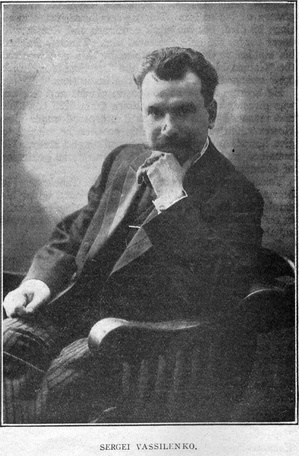 The mother at last persuaded her severe husband to allow a piano in the house, as she wished to have piano lessons for her daughter. The day the instrument made its appearance was an epoch-making day! Gretshaninoff passed his free time at the piano, trying to find out the melodies he had in his head; so that his mother soon perceived his musical talent and after a long and hard struggle got the strict father to allow the boy to enter the Conservatoire (1881). He studied thoroughly, went to Petersburg to the same institution, as he greatly desired Rimski-Korsakow as teacher, but returned to Moscow, had piano lessons from Safonoff and studied counterpoint with Taneiew, who again helped to develop a young talent and set it on the right path. Vocal music of different forms was chosen by him for his first compositions: “Masses” for Russian church services, which were so exceedingly interesting and beautiful that he became soon well known. Meantime, he composed overtures for Russian dramas with quite Russian melodies. Later on appeared his opera, Dobrynia Nikititsh, on the stage of the Imperial Opera House, the subject of which was taken from an ancient Russian myth, on account of this it abounded in Russian airs, had a Leitmotiv and won great success. His romances, choruses and children songs aroused greater and greater interest. He dedicated a beautiful Trio to Taneiew, his master in counterpoint, whom he worshiped. Songs, symphonies, etc., followed.
The mother at last persuaded her severe husband to allow a piano in the house, as she wished to have piano lessons for her daughter. The day the instrument made its appearance was an epoch-making day! Gretshaninoff passed his free time at the piano, trying to find out the melodies he had in his head; so that his mother soon perceived his musical talent and after a long and hard struggle got the strict father to allow the boy to enter the Conservatoire (1881). He studied thoroughly, went to Petersburg to the same institution, as he greatly desired Rimski-Korsakow as teacher, but returned to Moscow, had piano lessons from Safonoff and studied counterpoint with Taneiew, who again helped to develop a young talent and set it on the right path. Vocal music of different forms was chosen by him for his first compositions: “Masses” for Russian church services, which were so exceedingly interesting and beautiful that he became soon well known. Meantime, he composed overtures for Russian dramas with quite Russian melodies. Later on appeared his opera, Dobrynia Nikititsh, on the stage of the Imperial Opera House, the subject of which was taken from an ancient Russian myth, on account of this it abounded in Russian airs, had a Leitmotiv and won great success. His romances, choruses and children songs aroused greater and greater interest. He dedicated a beautiful Trio to Taneiew, his master in counterpoint, whom he worshiped. Songs, symphonies, etc., followed.
Lately he has been carried away by the power of poets of other nations. His enthusiasm for them has gone so far, that he has composed an opera on Maeterlinck’s Soeur Beatrice, set to music Burns’s Songs of Scotland, poems of Baudelaire, the hyper-modern French poet, forming them into various series, each series bearing out one idea, but the songs of which can be sung separately—thus forming precious pearls of music, each one complete in itself.
Gretshaninoff has now arrived at the full development of his musical gifts and we may hope to hear more of him in the near future.


